NHS Scotland eHealth Strategy 2008 - 2011 Launched
- Details
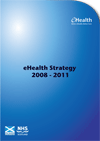 The eHealth Strategy for 2008 - 2011 was formally launched by Nicola Sturgeon at this year's NHS Scotland Event. The vision for eHealth supports the goals as set out in the Better Health Better Care Action Plan. This is about exploiting the power of electronic information to help ensure that patients get the right care, involving the right clinicians, at the right time, to deliver the right outcomes. It is therefore as much about transforming traditional processes as it is about technology.
The eHealth Strategy for 2008 - 2011 was formally launched by Nicola Sturgeon at this year's NHS Scotland Event. The vision for eHealth supports the goals as set out in the Better Health Better Care Action Plan. This is about exploiting the power of electronic information to help ensure that patients get the right care, involving the right clinicians, at the right time, to deliver the right outcomes. It is therefore as much about transforming traditional processes as it is about technology. The Impact of eHealth on the Quality & Safety of Healthcare
- Details
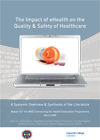 A Systemic Overview & Synthesis of the Literature
A Systemic Overview & Synthesis of the LiteratureReport for the NHS Connecting for Health Evaluation Programme
Josip Car, Ashly Black, Chantelle Anandan, Kathrin Cresswell, Claudia Pagliari, Brian McKinstry, Rob Procter, Azeem Majeed and Aziz Sheikh
- There have been substantial developments in information technology hardware and software capabilities over recent decades and there is now considerable potential to apply these technological developments in relation to aspects of healthcare provision.
Sustainable Telemedicine: Paradigms for Future-Proof Healthcare
- Details
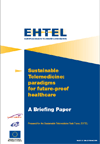 With this Briefing Paper, EHTEL would like to offer all stakeholders, i.e. politicians, citizens/patients, health professionals, healthcare providers, health insurers and many others a snapshot of the State of the Art on the European, National and Regional levels with the focus on sustainable services. Based on a summary of what has been achieved - particularly in the form of routinely used (but often still small scale) telemedicine services across Europe - a set of recommendations towards a "Vision for Europe 2020: Integrated Telemedicine Services" is established.
With this Briefing Paper, EHTEL would like to offer all stakeholders, i.e. politicians, citizens/patients, health professionals, healthcare providers, health insurers and many others a snapshot of the State of the Art on the European, National and Regional levels with the focus on sustainable services. Based on a summary of what has been achieved - particularly in the form of routinely used (but often still small scale) telemedicine services across Europe - a set of recommendations towards a "Vision for Europe 2020: Integrated Telemedicine Services" is established. White Paper Healthcare Industry in Germany
- Details
 The German healthcare industry is increasingly becoming a focus of media interest, a trend driven by developments such as statutory liberalization, the mergers of medical service providers, and IT solutions that improve the efficiency of paying authorities and service providers. The structural change in the industry that gives rise to these developments demands the support of appropriate Information and Communication Technologies (ICT).
The German healthcare industry is increasingly becoming a focus of media interest, a trend driven by developments such as statutory liberalization, the mergers of medical service providers, and IT solutions that improve the efficiency of paying authorities and service providers. The structural change in the industry that gives rise to these developments demands the support of appropriate Information and Communication Technologies (ICT). Mobile Clinical Assistant Platform Prototype: Mobile Point-of-Care Technology
- Details
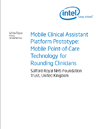 Salford Royal NHS Foundation Trust, United Kingdom
Salford Royal NHS Foundation Trust, United KingdomA wide range of clinical support healthcare professionals (allied health professionals) conduct rounds in a hospital, including physicians, physical therapists, ward nurses, dieticians, and phlebotomists. These rounding "clinicians" often have far more restricted access to healthcare information technology than a hospital's resident staff.
Benchmarking ICT use among General Practitioners in Europe
- Details
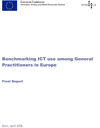 This report presents the outcomes of the "Pilot on eHealth Indicators" study, carried out by empirica in association with IPSOS on behalf of the European Commission, Information Society and Media Directorate-General. The data used for this report were collected by means of a survey of primary care physicians and their use of ICT for eHealth purposes. The survey was carried out in all 27 Member States of the European Union and in Norway and Iceland in 2007.
This report presents the outcomes of the "Pilot on eHealth Indicators" study, carried out by empirica in association with IPSOS on behalf of the European Commission, Information Society and Media Directorate-General. The data used for this report were collected by means of a survey of primary care physicians and their use of ICT for eHealth purposes. The survey was carried out in all 27 Member States of the European Union and in Norway and Iceland in 2007. Preparing Europe's Digital Future i2010 Mid-Term Review
- Details
 Brussels, 17.04.2008
Brussels, 17.04.2008COM(2008) 199 final
Information and Communication Technologies (ICTs) continue to be a major driver of economic and social modernisation. Today, businesses in the EU devote 20% of investment to ICTs, and the sector accounts for 26% of overall research expenditure. Moreover, 60% of basic public services are now fully available online and more than half of EU citizens use the Internet regularly.
More Digital Health News ...
- Legally eHealth: Putting eHealth in its European Legal Context
- eHealthNews.EU Portal Research Project - Invitation for Further Collaboration
- Consultation Workshop on Personal Health Systems - Report
- SAP for Healthcare: Healthcare Providers Industry Overview
- National Strategy for eHealth - Sweden
- E-Health and Society: An Empirical Study of Catalonia Research Report
- National Programme for IT in the NHS Benefits Statement 2006/07